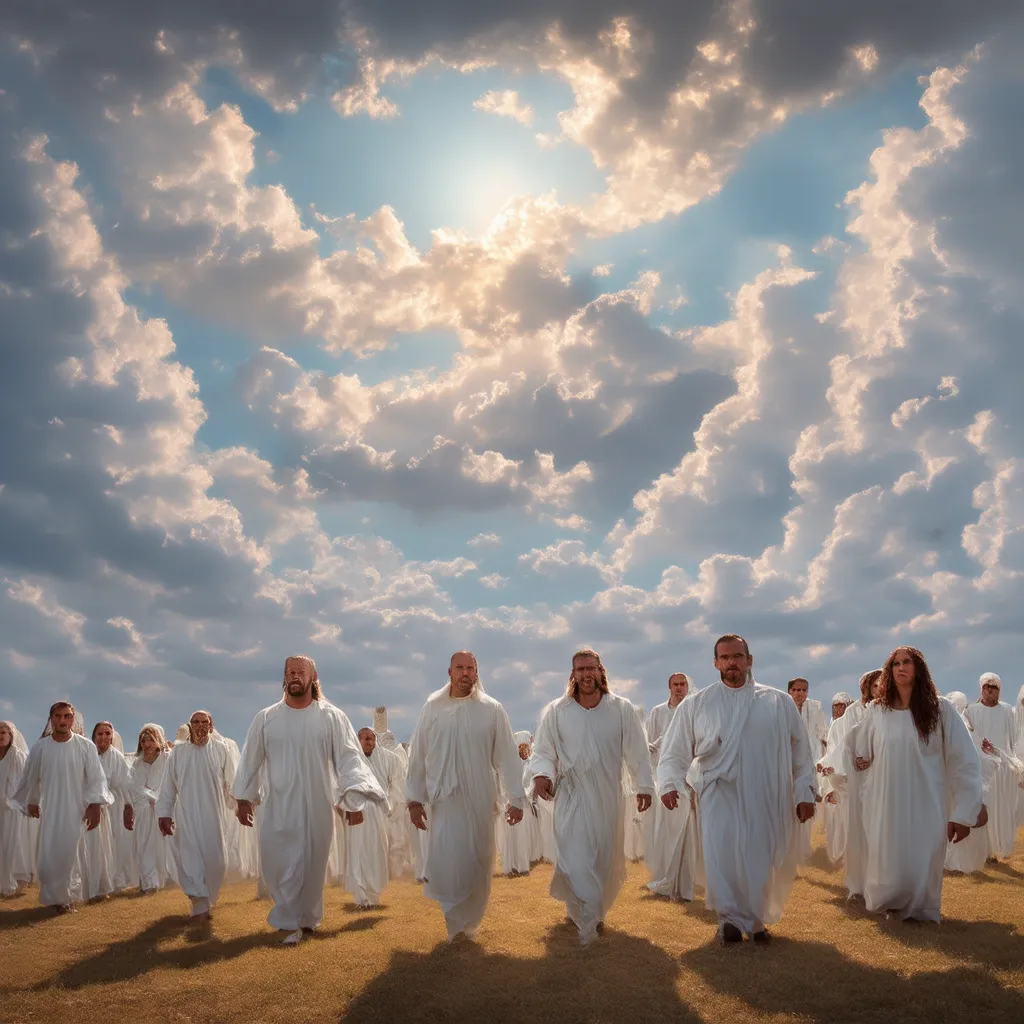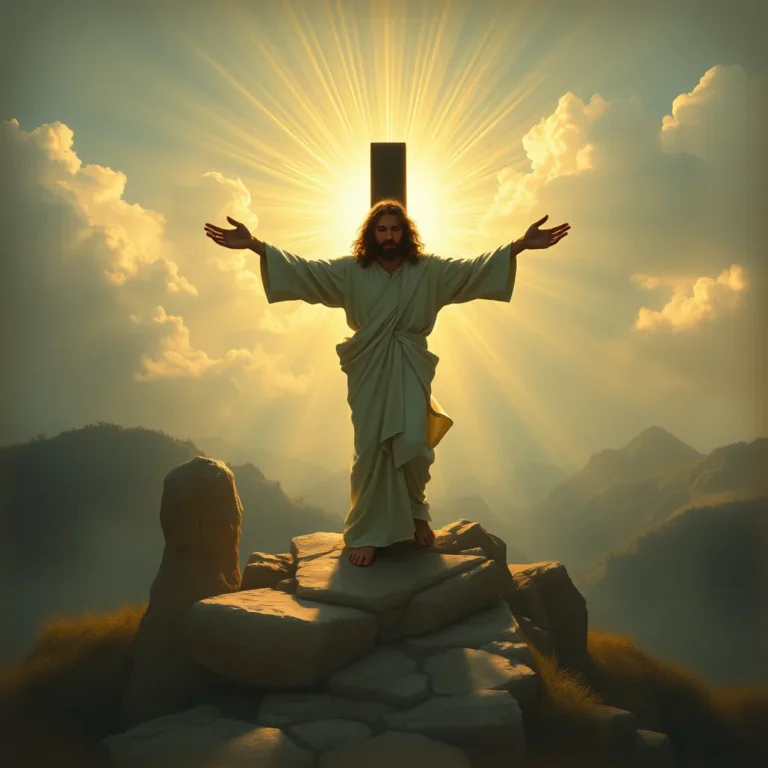
(*All Bible verses are from the NIV unless otherwise noted)
Chapter 19
11 I saw heaven standing open and there before me was a white horse, whose rider is called Faithful and True. With justice he judges and wages war.
12 His eyes are like blazing fire, and on his head are many crowns. He has a name written on him that no one knows but he himself.
13 He is dressed in a robe dipped in blood, and his name is the Word of God.
14 The armies of heaven were following him, riding on white horses and dressed in fine linen, white and clean.
15 Coming out of his mouth is a sharp sword with which to strike down the nations. “He will rule them with an iron scepter.” He treads the winepress of the fury of the wrath of God Almighty.
16 On his robe and on his thigh he has this name written: KING OF KINGS AND LORD OF LORDS.
17 And I saw an angel standing in the sun, who cried in a loud voice to all the birds flying in midair, “Come, gather together for the great supper of God,
18 so that you may eat the flesh of kings, generals, and the mighty, of horses and their riders, and the flesh of all people, free and slave, great and small.”
Rev 19:11
I saw heaven standing open and there before me was a white horse, whose rider is called Faithful and True:
John has seen the heavens open twice before (4:1; 11:19). As noted in chapter 6, the white horse was the traditional symbol of victory and conquest. Kings and generals would often ride a white horse at the head of their armies during victory parades.
This rider is different from the one in Chapter 6. The first rider had a bow and was “bent on conquest” and was grouped with three other disasters coming on the earth. This rider is called “Faithful and True,” and his battle is “righteousness!” This is Christ, the Risen King, the Lion of Judah, the Victorious Lamb of God!
Rev 1:5 …and from Jesus Christ, who is the faithful witness, the firstborn from the dead, and the ruler of the kings of the earth. To him who loves us and has freed us from our sins by his blood,
Rev 3:14 … These are the words of the Amen, the faithful and true witness, the ruler of God’s creation.
The Greek word pistos, faithful, means adhering firmly and devotedly to one’s nature – to be reliable1. Alethinos means true and genuine,no falsehood 2, as opposed to fake or unreal. Jesus Christ is the one who brings complete truth with no shadow of falsehood or imitation. In Jesus, we meet the radiance of God’s glory and the exact imprint of His nature (Heb 1:3).
Rev 19:11
With justice he judges and wages war:
Christians sometimes question how the Jews could possibly miss their Messiah when he came. But the Judaic concept of “Messiah” wasn’t well-defined. Was he to be a conquering king, a teacher, or a prophet?
Stanley E. Porter writes: Intertestamental and New Testament literature suggests that the expectation [of Messiah] was all over the map. Some Jewish people did not expect a Messiah. Others thought that the Messiah would be a priestly figure, still others a royal deliverer. Some scholars interpret the evidence to suggest that at least one group of Jewish thinkers believed there would be two messiahs, one priestly and one royal. From what we know, we can be certain that the New Testament did not create the idea of the Messiah. But we can also be sure that there was nothing like a commonly agreed delineation of what the Messiah would be like. The latter point means that modern-day Christians who shake their heads about why the Jewish people did not universally recognize the Messiah, considering all the fulfilled prophecy, really do not understand Old Testament literature.3
Take for example Isa 61:1-3:
1 The Spirit of the Sovereign LORD is on me, because the LORD has anointed me to proclaim good news to the poor. He has sent me to bind up the brokenhearted, to proclaim freedom for the captives and release from darkness for the prisoners, 2 to proclaim the year of the Lord’s favor and the day of vengeance of our God, to comfort all who mourn, 3 and provide for those who grieve in Zion—to bestow on them a crown of beauty instead of ashes, the oil of joy instead of mourning, and a garment of praise instead of a spirit of despair.
These words, in the literal sense, could describe Isaiah’s personal calling by God to minister to wayward Israel. But Christians relate these words to Jesus’ ministry.
This is where understanding prophecy’s eternal nature becomes essential. Hundreds of verses have been defined by Christians as Messianic prophecies. Many of those, when read literally and in a historical context, can be interpreted as referencing the writers themselves or actual historical events, kings, or kingdoms.

But the prophetic nature of God’s words resonates beyond natural history as eternal principles – true and perfect throughout time! Isaiah may well have been recognizing his personal calling by God to proclaim good news to his spiritually lost people, but those words also prophetically describe the saving nature of the coming Messiah. Further, Isaiah’s verses define the calling of every Christian – to proclaim the good news of God’s grace through Jesus, to bring hope to the poor and despairing, to set free those who are in spiritual captivity, and to comfort those who mourn and are broken-hearted!
The people of John’s generation knew all about injustice and tyranny. Life and death rested on the whims of power-hungry Caesars and administrators. Wars and wholesale slaughter swept away entire cultures, not for justice and equality, but for lust and avarice. Unfortunately, some things have not greatly changed. Perversion of justice, capricious rulers, bribery, and crooked administrations still proliferate throughout our world.
Christ’s power is exercised in Godly justice – rightness, and fairness that will only exist when individuals, leaders, and entire nations exercise the selfless sacrifice exemplified in Jesus’ life. This kind of ultimate peace and equity can never be accomplished through man’s efforts alone, but will only exist with the final and complete intervention of Jehovah Nissi (the Lord is our victory! [Isa 11:3-4, Rev 18:2]).
Isa 11:3 …and he will delight in the fear of the LORD. He will not judge by what he sees with his eyes, or decide by what he hears with his ears; 4 …but with righteousness, he will judge the needy; with justice, he will give decisions for the poor of the earth. He will strike the earth with the rod of his mouth; with the breath of his lips, he will slay the wicked.
Rev 19:12
His eyes are like blazing fire, and on his head are many crowns. He has a name written on him that no one knows but he himself:
Note verses 12 and 13:
- Verse 12: the name written that no one knows but himself…
- Verse 13: the name by which he is called is the Word of God…
Ancient Hebrew contained no vowels. In the original Hebrew, God’s name transliterates to YHWH, possibly derived from a verb that means “to be,” “to exist,” “to cause to become,” or, “to come to pass4.” For the non-Jewish world, the terms Lord, Yahweh, and Jehovah are frequently used. Orthodox Jews and those who follow Talmudic traditions, out of reverence, do not pronounce God’s name or the forms Yahweh or Yehovah. They replace it with Adonai (“My Lord”) or Elohim (“Supreme One”), or HaShem (“The Name”)5.
H. B. Swete writes that something beyond man’s understanding resides in the very essence of Christ’s being: Notwithstanding the dogmatic helps which the Church offers, the mind fails to grasp the inmost significance of the Person of Christ, which eludes all efforts to bring it within the terms of human knowledge. Only the Son of God can understand the mystery of his own being6.
Rev 19:13
He is dressed in a robe dipped in blood:
Isaiah describes a Messianic figure with garments stained with the blood of His enemies:
Isa 63:1 Who is this coming from Edom, from Bozrah, with his garments stained crimson? Who is this, robed in splendor, striding forward in the greatness of his strength? “It is I, proclaiming victory, mighty to save.” 2 Why are your garments red, like those of one treading the winepress? 3 “I have trodden the winepress alone; from the nations no one was with me. I trampled them in my anger and trod them down in my wrath; their blood spattered my garments, and I stained all my clothing.
But John’s rider wears a garment “dipped in blood” before the battle even begins:
Rom 5:8 But God demonstrates his own love for us in this: While we were still sinners, Christ died for us.
Rev 12:11 They triumphed over him by the blood of the Lamb and by the word of their testimony; they did not love their lives so much as to shrink from death.
It could be said that there are two sources of blood on Christ’s robe: that which he shed for us, and that which is shed by all who die in his name!
Rev 19:13
And his name is the Word of God:
John 1:1 In the beginning was the Word, and the Word was with God, and the Word was God. 2 He was with God in the beginning. 3 Through him, all things were made; without him, nothing was made that has been made. 4 In him was life, and that life was the light of all mankind. 5 The light shines in the darkness, and the darkness has not overcome it.
The Greek term used here for “Word” is logos, meaning something said, an expression, a reasoning, or a motive7. The capitalized phrase “Word of God” denotes the Divine Expression, the Creator, the Word of Yahweh:
Caird writes: The word to which Jesus bore testimony in his life and death is now recognized to be indistinguishable from the person of the witness…”8.
Everything that God has purposed, thought, and promised is embodied in Christ Jesus – literally the Divine Expression of God:
John 10:30 I and the Father are one.”
Phil 2:5 In your relationships with one another, have the same mindset as Christ Jesus: 6 Who, being in very nature God, did not consider equality with God something to be used to his own advantage;
John 1:18 No one has ever seen God, but the one and only Son, who is himself God and is in closest relationship with the Father, has made him known.
Col 2:9 For in Christ all the fullness of the Deity lives in bodily form, 10 and in Christ you have been brought to fullness. He is the head over every power and authority.
Heb 1:3 The Son is the radiance of God’s glory and the exact representation of his being, sustaining all things by his powerful word. After he had provided purification for sins, he sat down at the right hand of the Majesty in heaven.
Col 1:15 The Son is the image of the invisible God, the firstborn over all creation.
Rev 19:14
The armies of heaven were following him, riding on white horses and dressed in fine linen, white and clean:

The “armies” following Christ aren’t dressed in armor ready for combat. They’re dressed in “linen, white and clean.” These are the redeemed of the world, those saved by the shed blood of the Redeemer – those who have bowed in obedience to Sovereign God!
Rev 3:4 … They will walk with me, dressed in white, for they are worthy.
Rev 3:18 I counsel you to buy from me gold refined in the fire, so you can become rich; and white clothes to wear, so you can cover your shameful nakedness; and salve to put on your eyes, so you can see.
Rev 4:4 Surrounding the throne were twenty-four other thrones, and seated on them were twenty-four elders. They were dressed in white and had crowns of gold on their heads.
Rev 6:11 Then each of them was given a white robe, and they were told to wait a little longer, until the full number of their fellow servants, their brothers and sisters, were killed just as they had been.
Rev 7:9 After this I looked, and there before me was a great multitude that no one could count, from every nation, tribe, people and language, standing before the throne and before the Lamb. They were wearing white robes and were holding palm branches in their hands.
Rev 7:14 I answered, “Sir, you know.” And he said, “These are they who have come out of the great tribulation; they have washed their robes and made them white in the blood of the Lamb.
Rev 19:15
Coming out of his mouth is a sharp sword with which to strike down the nations:
The Word of God (Christ) and the words of God (scripture) are like sharp swords. They cut through lies, destroy barriers, bring light into the darkness, and disarm all of Satan’s tactics and deceptions!
Isaiah 11:4 …but with righteousness he will judge the needy, with justice he will give decisions for the poor of the earth. He will strike the earth with the rod of his mouth; with the breath of his lips he will slay the wicked. 5 Righteousness will be his belt and faithfulness the sash around his waist.
Isa 49:2 He made my mouth like a sharpened sword, in the shadow of his hand he hid me; he made me into a polished arrow and concealed me in his quiver.
Heb 4:12 For the word of God is alive and active. Sharper than any double-edged sword, it penetrates even to dividing soul and spirit, joints and marrow it judges the thoughts and attitudes of the heart.

One of the Enemy’s most powerful weapons is the use of half-truths and misconceptions to build false realities. The world embraces those “realities” and normalizes them. Racism, sexism, hatred, and phobias can become so commonplace in a culture that, over time, some accept them as “normal,” and others pay them no attention at all.
For example, Jessica Brown of the BBC observes: Cultural normalization can happen organically over time – in a boiling-a-frog sort of way. This is the case for young people and recreational drug use, according to the authors of Illegal Leisure. In the book, researchers detail a five-year longitudinal study into young people and drug-taking, and argue that drugs – predominantly cannabis, but also LSD, amphetamines and ecstasy – are now accepted as a leisure activity, rather than being an act of rebellion. It states: “The new generation of drug user can no longer be seen as mad or bad or from subcultural worlds – they are ordinary and everywhere”.9
Other examples of changing attitudes and perceptions include:
- Gambling, once considered abhorrent to Christians, has become an acceptable way to raise money for good causes and to spend leisure time;
- Not so long ago, Christians viewed divorce as absolutely unacceptable. Today it’s considered by many as a normal way to escape a relationship and move on in life;
- Paul cautioned the saints not to allow unwholesome talk to come out of their mouths (Eph 4:29). Today, Rude words no longer shock Christians the way they did. The f-word is common fare in movies. Even for churchgoers, the occasional soft-core swear word is seen as irreverent humor at worst;
- For centuries, sex before marriage was considered completely taboo, whereas, in modern culture, it’s seen by many as a normal exercise of our human nature and an acceptable way to explore relationship options…
The Gospel is not propositional – rules we’re commanded to follow because they are… well, rules! God’s good news is about rich, wholesome, loving relationships. “Sins” are pursuits that destroy relationships, both with others and with God. The Bible is filled with wise advice, urging us to avoid certain behaviors due to their damaging effects, the squandering of God-given resources, the degradation and mistreatment of others, and the promotion of conflict instead of peace.
True reality is grounded solidly in God’s Word. Those who surrender themselves to God’s Holy Spirit of Truth discern Satan’s lies, regardless of how subtle or “normal” they seem.
Rev 19:15
He treads the winepress of the fury of the wrath of God Almighty:
The wine presses the ancients used consisted of two receptacles of vats placed at different levels. In the upper one, the grapes were crushed, and the juices flowed into the lower one.
Joel 3:13 Swing the sickle, for the harvest is ripe. Come, trample the grapes, for the winepress is full and the vats overflow— so great is their wickedness!”
The following verses use the vivid image of grapes to symbolize rebellious mankind and the winepress to describe the ultimate defeat of all that is wicked:

Isa 63:2 Why are your garments red, like those of one treading the winepress? 3 “I have trodden the winepress alone; from the nations, no one was with me. I trampled them in my anger and trod them down in my wrath; their blood spattered my garments, and I stained all my clothing. 4 It was for me the day of vengeance; the year for me to redeem had come.
Rev 14:19 The angel swung his sickle on the earth, gathered its grapes and threw them into the great winepress of God’s wrath.
Christians long for the day when all evil will be extinguished at Christ’s return. But in the immediate sense, Satan’s plan to permanently separate humankind from God was crushed when Jesus paid our ransom on the cross. As an eternal principle, Jesus taught that love defeats hate, that Satan’s plans are thwarted when believers respond in compassion and generosity, and when the saints confront war with peace.
Following Jesus’ example, people such as Gandhi, Martin Luther King, Jr., Mother Teresa, William Wilberforce, Florence Nightingale, Harriet Tubman, Rosa Parks, and countless others chose peace over conflict. Their absolute devotion to kindness and nonviolence forever changed human history.
Rev 19:16
On his robe and on his thigh he has this name written: KING OF KINGS AND LORD OF LORDS:
This Old Testament accolade was reserved for the mightiest of kings:
Ezek 26:7 “For this is what the Sovereign LORD says: From the north I am going to bring against Tyre Nebuchadnezzar king of Babylon, king of kings, with horses and chariots, with horsemen and a great army.
Dan 2:37 Your Majesty, you are the king of kings. The God of heaven has given you dominion and power and might and glory;
The apostles, when they wrote about Jesus, saw him as the embodiment of perfect authority and dominion.:
1 Tim 6:13 In the sight of God, who gives life to everything, and of Christ Jesus, who while testifying before Pontius Pilate made the good confession, I charge you 14 to keep this command without spot or blame until the appearing of our Lord Jesus Christ, 15 which God will bring about in his own time—God, the blessed and only Ruler, the King of kings and Lord of lords, 16 who alone is immortal and who lives in unapproachable light, whom no one has seen or can see. To him be honor and might forever. Amen.
Rev 17:14 They will wage war against the Lamb, but the Lamb will triumph over them because he is Lord of lords and King of kings—and with him will be his called, chosen and faithful followers.”
Rev 19:17-18
And I saw an angel standing in the sun, who cried in a loud voice to all the birds flying in midair, “Come, gather together for the great supper of God, 18 so that you may eat the flesh of kings, generals, and the mighty, of horses and their riders, and the flesh of all people:
The desert peoples of antiquity didn’t view vultures with the same disgust that modern societies tend to. They admired the graceful creature for its speed and ability to locate prey. Cursing enemies with the prospect of being left to the scavengers was a common threat and presented the picture of ultimate defeat:
Deut 28:26 Your carcasses will be food for all the birds and the wild animals, and there will be no one to frighten them away.
Luke 17:37 “Where, Lord?” they asked. He replied, “Where there is a dead body, there the vultures will gather.”

Footnotes
- Strong’s G4103. ↩︎
- Strong’s 228. ↩︎
- Stanley E. Porter, The Messiah in the Old and New Testaments, McMaster New Testament Studies. ↩︎
- Strong’s H3068. ↩︎
- Chabad.org, Why do Jews say “Hashem?” https://www.chabad.org/library/article_cdo/aid/1443443/jewish/Why-Do-Jews-Say-Hashem.htm. Accessed May 21, 2024. ↩︎
- Swete, Henry Barclay, Commentary on Revelation, Kregel Publications, third edition, Grand Rapids, Michigan, 1977. ↩︎
- Strong’s G3056. ↩︎
- Caird, p. 244. ↩︎
- Jessica Brown, BBC, The powerful way that ‘normalisation’ shapes our world, https://www.bbc.com/future/article/20170314-how-do-we-determine-when-a-behaviour-is-normal, 19 March 2017. ↩︎
*All Scripture quotations, unless otherwise indicated, are taken from the Holy Bible, New International Version®, NIV®. Copyright ©1973, 1978, 1984, 2011 by Biblica, Inc.™ Used by permission of Zondervan. All rights reserved worldwide. www.zondervan.comThe “NIV” and “New International Version” are trademarks registered in the United States Patent and Trademark Office by Biblica, Inc.™





